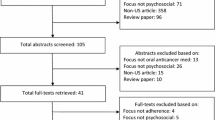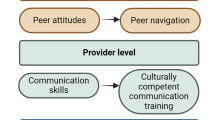Abstract
Background/significance
Over 168,000 women are living with metastatic breast cancer (MBC) in the USA. More efficacious treatments have lengthened overall survival, but these treatments often result in a myriad of symptoms and financial burden that may negatively impact perceptions of cancer treatment and medication-taking behavior.
Purpose
To explore cancer treatment–specific medication beliefs among women undergoing cancer treatment for MBC.
Methods
A qualitative study was conducted using semi-structured interviews that were audio recorded and transcribed verbatim. A thematic analysis was conducted using ATLAS.ti 8.0 software. Inter-rater reliability was set at a threshold of 0.80. Participants were recruited from a National Cancer Institute–designated comprehensive care center. Eligibility included ≥18 years old, English speaking, confirmed MBC diagnosis, and able/willing to complete interviews via telephone or Zoom.
Results
Participants (n = 16) were largely Caucasian (86.7%) and non-Hispanic (93.3%). Mean age was 55.62 years. Three major themes were revealed, with corresponding subthemes: (1) positive cancer treatment–specific medication beliefs highlighting the benefit of treatment (relief of cancer-related symptoms and medication efficacy: delayed disease progression/extended survival); (2) negative cancer treatment–specific medication beliefs that caused concern for cancer treatment (medication symptoms, side effects and drug-drug interactions, financial toxicity, lack of guarantee medication would work); and (3) dialectical cancer treatment–specific medication beliefs indicating the benefits of cancer treatment outweigh the risks.
Conclusion
Overall, participants noted that the benefits of cancer treatment outweighed the risks in the context of metastatic disease. Participants understood their prognosis and that they depended on their cancer treatment for survival. Oncology providers should continue to assess and address medication beliefs over the treatment trajectory and assist MBC patients with the decisional balance between the risk and benefit of continued cancer treatment.
Similar content being viewed by others
References
American Cancer Society. Metastatic breast cancer. (n.d.). Treatment of stage IV (metastastic) breast cancer. Retrieved from https://www.cancer.org/cancer/breast-cancer/treatment/treatment-of-breast-cancer-by-stage/treatment-of-stage-iv-advanced-breast-cancer.html
Mariotto AB, Etzioni R, Hurlbert M, Penberthy L, Mayer M (2017) Estimation of the number of women living with metastatic breast cancer in the United States. Cancer epidemiology, biomarkers & prevention : A publication of the American Association for Cancer Research, cosponsored by the American Society of Preventive Oncology 26(6):809–815
Mosher CE, DuHamel KN (2012) An examination of distress, sleep, and fatigue in metastatic breast cancer patients. Psycho-Oncology 21(1):100–107
Palesh OG, Collie K, Batiuchok D, Tilston J, Koopman C, Perlis ML et al (2007) A longitudinal study of depression, pain, and stress as predictors of sleep disturbance among women with metastatic breast cancer. Biological Psychology 75(1):37–44
Parkes A, Warneke CL, Clifton K, Al-Awadhi A, Oke O, Pestana RC et al (2018) Prognostic factors in patients with metastatic breast cancer with bone-only metastases. The Oncologist 23(11):1282–1306
Willis K, Lewis S, Ng F, Wilson L (2015) The experience of living with metastatic breast cancer—a review of the literature. Health Care for Women International 36(5):514–542
Ganz PA, Stanton AL (2015) Living with metastatic breast cancer. Advances in Experimental Medicine and Biology 862:243–254
Sambi M, Qorri B, Harless W, Szewczuk MR (2019) Therapeutic options for metastatic breast cancer. Breast Cancer Metastasis and Drug Resistance:131–172
Marshall VK, Given BA (2018) Factors associated with medication beliefs in patients with cancer: an integrative review. Oncology Nursing Forum 5(4):508–526
Chater AM, Parham R, Riley S, Hutchison AJ, Horne R (2014) Profiling patient attitudes to phosphate binding medication: a route to personalising treatment and adherence support. Psychology and Health 29:1407–1420
Horne R, Weinman J, Hankins M (1999) The beliefs about medicines questionnaire: the development and evaluation of a new method for assessing the cognitive representation of medication. Psychology and Health 14:1–24
Kalichman S, Kalichman MO, Cherry C (2016) Medication beliefs and structural barriers to treatment adherence among people living with HIV infection. Psychology and Health 31:383–395
Lu Y, Arthur D, Hu L, Cheng G, An F, Li Z (2016) Beliefs about antidepressant medication and associated adherence among older Chinese patients with major depression: a cross-sectional survey. International Journal of Mental Health Nursing 25:71–79
Saratsiotou I, Kordoni M, Bakogiannis C, Livadarou E, Skarlos D, Kosmidis PA, Razis E (2011) Treatment adherence of cancer patients to orally administered chemotherapy: insights from a Greek study using a self-reported questionnaire. Journal of Oncology Pharmacy Practice 17:304–311
Marshall VK (2018) Medication beliefs among advanced cancer patients receiving oral oncolytic agents. Michigan State University
Sikorskii A, Given CW, Given BA, Vachon E, Krauss JC, Rosenzweig M et al (2018) An automated intervention did not improve adherence to oral oncolytic agents while managing symptoms: results from a two-arm randomized controlled trial. Journal of Pain and Symptom Management 56(5):727–735
Fink AK, Gurwitz J, Rakowski W, Guadagnoli E, Silliman RA (2004) Patient beliefs and tamoxifen discontinuance in older women with estrogen receptor–positive breast cancer. Journal of Clinical Oncology 22:3309–3315
Gatti ME, Jacobson KL, Gazmararian JA, Schmotzer B, Kripalani S (2009) Relationships between beliefs about medications and adherence. American Journal of Health-System Pharmacy 66:657–664
Heisig SR, Shedden-Mora MC, von Blanckenburg P, Rief W, Witzel I, Albert US, Nestoriuc Y (2016) What do women with breast cancer expect from their treatment? Correlates of negative treatment expectations about endocrine therapy. Psycho-Oncology 25:1485–1492
Moon Z, Moss-Morris R, Hunter MS, Carlisle S, Hughes LD (2017) Barriers and facilitators of adjuvant hormone therapy adherence and persistence in women with breast cancer: a systematic review. Patient Preference and Adherence 11:305–322
Marshall VK, Given CW, Sikorskii A, Given BA, Lehto RH (2020) How adverse events and permanent medication stoppages affect changes in patients’ beliefs about oral antineoplastic agents. Supportive Care in Cancer 28(6):2589–2596
Marshall VK, Lehto RH, Given CW, Given BA, Sikorskii A (2019) Conceptualisation of medication beliefs among patients with advanced cancer receiving oral oncolytic agents using a theory derivation approach. European Journal of Cancer Care 28(2):e12988–e12998
Guest G, MacQueen KM, Namey EE (2011) Applied thematic analysis. Sage Publications
Guest G, Bunce A, Johnson L (2006) How many interviews are enough? An experiment with data saturation and variability. Field Methods 18(1):59–82
Balmer CE, Thomas P, Osborne RJ (2001) Who wants second-line, palliative chemotherapy? Psycho-Oncology 10:410–418
Hirose, T., Yamaoka, T., Ohnishi, T., Sugiyama, T., Kusumoto, S., Shirai, T., . . . Adachi, M. (2009). Patient willingness to undergo chemotherapy and thoracic radiotherapy for locally advanced non-small cell lung cancer. Psycho-Oncology, 18, 483–489.
Stiggelbout AM, De Haes JC, Kiebert GM, Kievit J, Leer JW (1996) Tradeoffs between quality and quantity of life: development of the QQ questionnaire for cancer patient attitudes. Medical Decision Making 16:184–192
Corter AL, Findlay M, Broom R, Porter D, Petrie KJ (2013) Beliefs about medicine and illness are associated with fear of cancer recurrence in women taking adjuvant endocrine therapy for breast cancer. British Journal of Health Psychology 18:168–181
Thuné-Boyle IC, Myers LB, Newman SP (2006) The role of illness beliefs, treatment beliefs, and perceived severity of symptoms in explaining distress in cancer patients during chemotherapy treatment. Behavioral Medicine 32:19–29
Llewellyn CD, McGurk M, Weinman J (2006) Head and neck cancer: to what extent can psychological factors explain differences between health-related quality of life and individual quality of life? British Journal of Oral and Maxillofacial Surgery 44:351–357
Chen LC, Chen TC, Huang YB, Chang CS (2014) Disease acceptance and adherence to imatinib in Taiwanese chronic myeloid leukaemia outpatients. International Journal of Clinical Pharmacy 36:120–127
Boşnak AS, Birand N, Diker Ö, Abdi A, Başgut B (2019) The role of the pharmacist in the multidisciplinary approach to the prevention and resolution of drug-related problems in cancer chemotherapy. Journal of Oncology Pharmacy Practice 25(6):1312–1320
Olszewski AJ, Zullo AR, Nering CR, Huynh JP (2018) Use of charity financial assistance for novel oral anticancer agents. Journal of Oncology Practice 14(4):e221–e228
Kircher SM, Meeker CR, Nimeiri H et al (2016) The parity paradigm: can legislation help reduce the cost burden of oral anticancer medications? Value Health. 19:88–98
Jennifer Matthews RN, Melina Stokan RN, Kook Y (2019) Financial toxicity among women with metastatic breast cancer. Oncology Nursing Forum 46(1):83–91
Iskandarsyah A, de Klerk C, Suardi DR, Soemitro MP, Sadarjoen SS, Passchier J (2014) Psychosocial and cultural reasons for delay in seeking help and nonadherence to treatment in Indonesian women with breast cancer: a qualitative study. Health Psychology 33:214–221
Jansen SJ, Otten W, Baas-Thijssen MC, van de Velde CJ, Nortier JW, Stiggelbout AM (2005) Explaining differences in attitude toward adjuvant chemotherapy between experienced and inexperienced breast cancer patients. Journal of Clinical Oncology 23:6623–6630
Del Castillo A, Godoy-Izquierdo D, Vázquez ML, Godoy JF (2011) Illness beliefs about cancer among healthy adults who have and have not lived with cancer patients. International Journal of Behavioral Medicine 18:342–351
Voogt E, van der Heide A, Rietjens JA, van Leeuwen AF, Visser AP, van der Rijt CC, van der Maas PJ (2005) Attitudes of patients with incurable cancer toward medical treatment in the last phase of life. Journal of Clinical Oncology 23:2012–2019
Barak F, Ostrowsky LA, Kreitler S (2012) Adjuvant chemotherapy for breast cancer patients: patients’ expectations and physicians’ attitudes. Palliative and Supportive Care 10:107–114
Bickell NA, Weidmann J, Fei K, Lin JJ, Leventhal H (2009) Underuse of breast cancer adjuvant treatment: patient knowledge, beliefs, and medical mistrust. Journal of Clinical Oncology 27:5160–5167
Availability of data and materials
All data specific to this research article have been stored on a secure database and are available by making a formal request to the primary author, Dr. Victoria K. Marshall, Assistant Professor, University of South Florida, College of Nursing, at vkmarshall@usf.edu.
Code availability
All data, associated codes, and codebooks included in this article are available upon formal request to the primary author, Dr. Victoria K. Marshall, Assistant Professor, University of South Florida, College of Nursing, at vkmarshall@usf.edu.
Author information
Authors and Affiliations
Contributions
All the authors contributed to the study conception and design. Dr. Pooja Advani, Dr. Dawn Mussallem, and Dr. Cindy Tofthagen contributed to the IRB submission and recruitment of participants. Material preparation, and data collection and analysis were performed by Victoria K. Marshall, Constance Visovsky, and Cindy Tofthagen. The first draft of the manuscript was written by Victoria K. Marshall, and all the authors commented on, contributed to, and approved the final versions of the manuscript.
Corresponding author
Ethics declarations
Ethics approval
The Institutional Review Board from Mayo Clinic, Jacksonville, Florida, approved this study, IRB# 19-006784.
Consent to participate and publish results
Informed consent was obtained from all individual participants included in the study. Additionally, participants consented to having their data published.
Competing interests
The authors declare no competing interests.
Additional information
Publisher’s note
Springer Nature remains neutral with regard to jurisdictional claims in published maps and institutional affiliations.
Rights and permissions
About this article
Cite this article
Marshall, V.K., Visovsky, C., Advani, P. et al. Cancer treatment–specific medication beliefs among metastatic breast cancer patients: a qualitative study. Support Care Cancer 30, 6807–6815 (2022). https://doi.org/10.1007/s00520-022-07101-7
Received:
Accepted:
Published:
Issue Date:
DOI: https://doi.org/10.1007/s00520-022-07101-7




